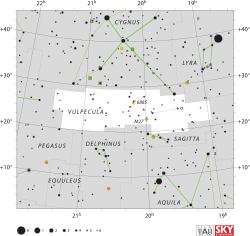NR Vulpeculae
| NR Vulpeculae | |
 | |
| Observationsdata Epok: J2000.0 | |
|---|---|
| Stjärnbild | Räven |
| Rektascension | 19t 50m 11,9280s[1] |
| Deklination | +24° 55′ 24,1775″[1] |
| Skenbar magnitud () | 9,13 – 9,61[2] |
| Stjärntyp | |
| Spektraltyp | M1 Ia[2] |
| Variabeltyp | Långsam irreguljär variabel[2] |
| Astrometri | |
| Radialhastighet () | +11,58 ± 0,33[3] km/s |
| Egenrörelse (µ) | RA: -2,320 ± 0,073[1] mas/år Dek.: -5,807 ± 0,071[1] mas/år |
| Parallax () | 0,5633 ± 0,0516[1] |
| Avstånd | 5 800 ± 500 lå (1 800 ± 200 pc) |
| Detaljer | |
| Massa | 4,92[4] M☉ |
| Radie | 553[5] R☉ |
| Luminositet | 111 000[6] - 223 000[7] L☉ |
| Temperatur | 3 986 ± 170[5] K |
| Metallicitet | +0,093[5] |
| Andra beteckningar | |
| HD 339034, BD+24 3902, DO 18219, GSC 02144-01244, IRAS 19480+2447, IRC +20438, 2MASS J19501193+2455240, RAFGL 2462, TYC 2144-1244-1, UCAC2 40577951, NR Vulpeculae, Gaia DR3 2020687421645374720, Gaia DR1 2020687417329221248, Gaia DR2 2020687421645374720[3] | |
NR Vulpeculae eller HD 339034, är ensam stjärna belägen i den mellersta delen av stjärnbilden Räven. Den har en skenbar magnitud av ca 9,13 – 9,61[2] och kräver ett teleskop för att kunna observeras. Baserat på parallax enligt Gaia Data Release 2 på ca 0,563 mas,[1] beräknas den befinna sig på ett avstånd på ca 5 800 ljusår (1 800 parsek) från solen. Den rör sig bort från solen med en heliocentrisk radialhastighet på ca 12 km/s.[5] Stjärnan antas troligen ingå i stjärnföreningen OB1 Vulpeculae.[8]
Egenskaper
NR Vulpeculae är en röd till orange superjättestjärna[7] av spektralklass M1 Ia.[2] Den har en massa som är ca 5[4] solmassor, en radie på ca 553[5] solradier och utsänder från dess fotosfär energi motsvarande 111 000[6] - 223 000[7] gånger solen vid en effektiv temperatur av ca 4 000 K.[5]

ER Vulprculae är en långsam irreguljär variabel.[2]
Referenser
- Den här artikeln är helt eller delvis baserad på material från engelskspråkiga Wikipedia, NR Vulpeculae, 3 december 2023.
Noter
- ^ [a b c d e f] Brown, A. G. A.; et al. (Gaia collaboration) (August 2018). "Gaia Data Release 2: Summary of the contents and survey properties". Astronomy & Astrophysics. 616. A1. arXiv:1804.09365. Bibcode:2018A&A...616A...1G. doi:10.1051/0004-6361/201833051. Gaia DR2 record for this source at VizieR.
- ^ [a b c d e f] NR Vul, database entry, The combined table of GCVS Vols I-III and NL 67-78 with improved coordinates, General Catalogue of Variable Stars Archived 2017-06-20 at the Wayback Machine, Sternberg Astronomical Institute, Moscow, Russia. Accessed on line November 12, 2010.
- ^ [a b] NR Vulpeculae (unistra.fr). Hämtad 2024-02-13.
- ^ [a b] Anders, F.; Khalatyan, A.; Chiappini, C.; Queiroz, A. B.; Santiago, B. X.; Jordi, C.; Girardi, L.; Brown, A. G. A.; Matijevič, G.; Monari, G.; Cantat-Gaudin, T.; Weiler, M.; Khan, S.; Miglio, A.; Carrillo, I.; Romero-Gómez, M.; Minchev, I.; De Jong, R. S.; Antoja, T.; Ramos, P.; Steinmetz, M.; Enke, H. (2019). "Photo-astrometric distances, extinctions, and astrophysical parameters for Gaia DR2 stars brighter than G = 18". Astronomy and Astrophysics. 628: A94. arXiv:1904.11302. Bibcode:2019A&A...628A..94A. doi:10.1051/0004-6361/201935765. S2CID 131780028.
- ^ [a b c d e f] Messineo, M.; Brown, A. G. A. (2019). "A Catalog of Known Galactic K-M Stars of Class I Candidate Red Supergiants in Gaia DR2". The Astronomical Journal. 158 (1): 20. arXiv:1905.03744. Bibcode:2019AJ....158...20M. doi:10.3847/1538-3881/ab1cbd. S2CID 148571616.
- ^ [a b] Mauron, N.; Josselin, E. (2011). "The mass-loss rates of red supergiants and the de Jager prescription". Astronomy and Astrophysics. 526: A156. arXiv:1010.5369. Bibcode:2011A&A...526A.156M. doi:10.1051/0004-6361/201013993. S2CID 119276502.
- ^ [a b c] Dorn-Wallenstein, Trevor Z.; Levesque, Emily M.; Neugent, Kathryn F.; Davenport, James R. A.; Morris, Brett M.; Gootkin, Keyan (2020), "Short-term Variability of Evolved Massive Stars with TESS. II. A New Class of Cool, Pulsating Supergiants", The Astrophysical Journal, 902 (1): 24, arXiv:2008.11723, Bibcode:2020ApJ...902...24D, doi:10.3847/1538-4357/abb318, S2CID 221340538
- ^ Levesque, Emily M.; Massey, Philip; Olsen, K. A. G.; Plez, Bertrand; Josselin, Eric; Maeder, Andre; Meynet, Georges (August 2005). "The Effective Temperature Scale of Galactic Red Supergiants: Cool, but Not As Cool As We Thought". The Astrophysical Journal. 628 (2): 973–985. arXiv:astro-ph/0504337. Bibcode:2005ApJ...628..973L. doi:10.1086/430901. S2CID 15109583.
- ^ "ASAS-SN Variable Stars Database". ASAS-SN Variable Stars Database. ASAS-SN. Hämtad 6 januari 2022.
Externa länkar
| |||||||||||||||||||
Media som används på denna webbplats
Författare/Upphovsman: IAU and Sky & Telescope magazine (Roger Sinnott & Rick Fienberg), Licens: CC BY 3.0
IAU Vulpecula chart
Författare/Upphovsman: PopePompus, Licens: CC BY-SA 4.0
A V band light curve for NR Vulpeculae, plotted from ASAS-SN data



